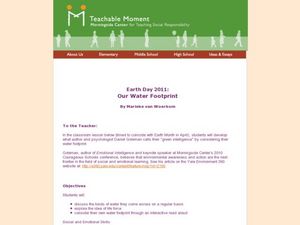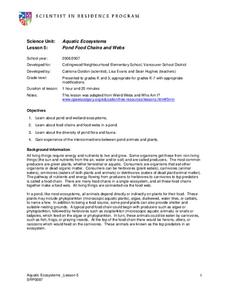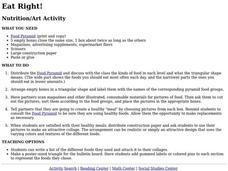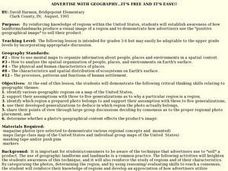Curated OER
Collecting Compost
Students observe a composting box. In this soil lesson, students create a composting bin by using a bin, newspaper, worms, and food scraps. Students create a composting food web.
Curated OER
Party Time: Word Problems
In this word problem worksheet, learners solve a total of 7 problems about quantities of invitations, plates, drinks, candy, and pizza for a party, as well as number of CD's for dancing
Curated OER
The Giant Barrel Sponge
Students study barrel sponges. In this science and art lesson, students discuss what sponges are, create their own sponge, and share what they created with the rest of the class.
Curated OER
Over a Barrel
Students examine oil reliance in Britain and around the world. For this oil crisis lesson, students discuss how oil is produced and consider the supply left in the world. Students also examine the influences of oil prices and discover...
Curated OER
Let's Sort a Salad
Students examine edible plants by identifying salad ingredients. In this botany instructional activity, students discuss the different vegetables that can be eaten in a salad and draw them on a worksheet. Students review vegetable...
Curated OER
Ecological Impact of Cyanide Heap Leaching
Students explore the environment by researching mining. In this ecological dangers lesson, students define cyanide and discuss why it has potential to be a great threat to our environment during mining expeditions. Students examine many...
Curated OER
Our Water Footprint
Students discuss the water usage of the world and their own water usage. In this water lesson plan, students read a story about water and discuss different statistics of water usage around the world.
Curated OER
The Buzz on Bees-How Bees Make Our World a Little Sweeter
These lessons can help students learn about the important role bees play in the ecosystem.
Curated OER
Ecology - Ecosystem
Third graders research ecosystems, the work of ecologists, John Muir's contribution to the environment and an endangered species of their choice. They read books, participate in discussions, and write reports.
Curated OER
March Market
Students role play a living wetland food web. They trace the food web associated with the items in their lunch.
Curated OER
The Web Of Life - Overlapping Food Chains
Students perform an activity in which they discover what happens when food chains overlap in an ecosystem and discover the three components of a food web.
Curated OER
Growing and Changing
Third graders discuss how their major life roles change as they get older and fill out a worksheet.
Curated OER
Survival Features
Third graders identify features of producers, herbivores and carnivores. They discuss the features that aid in survival for those animals. They organize animals into categories to complete the lesson.
Curated OER
The Balance of Good Health and the Food Pyramid
Young scholars explore the importance of good health and the food pyramid. They examine food labels and the importance of healthy food choices. Students investigate food additives.
Curated OER
Cows, Worms, and Compost
Students study decomposition. In this decomposition lesson, students discuss the background information about decomposition. Students then complete the 'Chew It Twice' worksheet.
Curated OER
Aquatic Ecosystems
Students study ponds and wetland ecosystems and examine the food chains and webs in them. In this aquatic ecosystems lesson students answer questions about the diversity of the flora and fauna in a pond.
Curated OER
Worm Composting: Vermiculture
Young scholars compost in a limited space and describe the decomposing process. Students convert unwanted, organic matter, particularly food scraps and paper into fertile soil.
Curated OER
Eat Right!
Students use magazines and other food pictures to arrange healthy meals onto construction paper.
Curated OER
Webbing the Food Chain
Students compose a visual representation of the food chain cycle using Inspiration educational software.
Curated OER
Advertise With Geography...it's Free And It's Easy!!
Learners establish awareness of how landforms/landmarks produce a visual image of a region and demonstrate how advertisers use the "positive geographical image" to sell their product by creating their own advertisements.
Curated OER
Philanthropy is Everywhere Lesson 3: Philanthropy "giants"
Young scholars discover corporations that engage in philanthropy. They identify who the recipients of corporate philanthropy might be, complete worksheets and compile the related data.
Curated OER
Closer To the Ground Lesson 2: Providing a Helping Hand
Students examine how businesses and corporations contribute or sponsor activities for the common good. They read annual reports of major corporations to determine how they contribute to focused activities for the common good.
Curated OER
Chromosome Fusion
Students see how patterns can reveal events of the past, thereby merging elements of both experimental and historical science.
Curated OER
WHY WE AREN'T FILTER FEEDERS
Students describe three methods of obtaining food: scavenging, filter feeding, and hunting. They describe three methods of obtaining food: scavenging, filter feeding, hunting, and list at least two reasons why humans are not considered...
Other popular searches
- Producers and Consumers
- Consumers and Decomposers
- Producers an Consumers
- Producers Consumers
- Corn Consumers
- Teenage Consumers
- Consumers and Advertising
- Consumers Rights
- Critical News Consumers
- Producer and Consumers
- What Makes Us Consumers
- Family and Consumers























